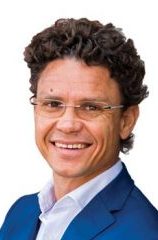In conversation with
Mr Jerome Kisting
Managing Director and Portfolio Manager | Baobab Capital (Pty) Ltd

Tags: africa, Financial Services, Namibia, Private Equity, SADC
FDI Spotlight: What is the biggest challenge you encounter in Namibia’s small to medium-sized enterprises (SME) sector and when working with these entrepreneurs?
Jerome Kisting: It is difficult to single out one challenge. Financial literacy is a challenge for mawwny entrepreneurs. There are two levels of financial literacy that pose challenges. The first is a basic level of knowing how to run a business and understanding aspects such as income and operating expenses; most of the entrepreneurs I meet do not have a problem with this.
However, the challenge is the second level of business financial literacy. The more subtle aspects of running a business such as knowing how to use strategic financial management to leverage capital and the skills or experience to make operational improvements based on measuring performance.
Most entrepreneurs do not necessarily have the capacity to identify and leverage these subtleties. You learn through experience, which takes time, and by operating in that environment daily.
The SME market here in Namibia is small. People understand the market and its dynamics, their businesses, how to pitch their product, how many competitors they have and who their main competitor is. We help them in terms of the technical aspects involved in scaling the business and add value by helping them understand those aspects.
While we believe there are tremendous opportunities in select sectors in Namibia, we believe the potential for development and the big opportunities are outside our borders. When we look at investment opportunities, we look at the extent to which we can grow Namibian investments into the SADC region.
Namibia is a great environment to nurture this growth due to the quality of the infrastructure. Our telecoms system is good and improving, which makes communication predictable and cheap; travelling by plane or car is easy, and the financial infrastructure for electronic transactions is excellent. We are thus leveraging Namibian infrastructure to grow businesses in the SADC region.
The market’s size also makes it a great environment in which to prove concept. It is relatively cheap, which is great because there is less of a chance to over capitalize when piloting a new product or service. We, therefore, can test ideas, package it and then export it to other countries. It is one area in which Namibia has an under-exploited competitive advantage in the SADC region.
However, when you consider the challenges the country faces, we have to be honest and realistic about the fact we are not as successful in all areas of our development as we can be. There are many socioeconomic issues we need to address, and I think the best way to do that is to have an external focus, to trade. The more we focus on and target other African countries, and operate with our eye on international markets and global value chains, the quicker our economy will grow, the more jobs we’ll create and so doing address some of our more severe social challenges.
In terms of FDI and the demographics of Africa, the so-called Africa rising, how vital is a platform of venture capitalism to enhance Namibia’s economy?
Jerome Kisting: It is crucial. Venture capital goes where other forms of capital won’t go; venture capitalists look at a business model and considers whether the team can scale the business successfully.
Namibia has many positive aspects that make it a desirable location for venture capitalists. I am very interested to see how an investment of this type would impact Namibia the SME sector. We aim to achieve that with the Baobab Growth Fund over the next few years.
It is important to know any venture capitalist who invests here will have to work hand in hand with local entrepreneurs. They will have to combine mentoring and capacity building support with their investment of capital.
That said, Namibia and its people are driven by the incredible potential of the country. There is a kind of magic in the air; everyone senses we have the potential for great things. That sentiment is there despite the 45 – 50 000 households that live in informal settlements in Windhoek alone. People still wake up every day and work hard to make ends meet and fulfil their dreams.
Namibians have a sense of accountability, and they feel they can play a role, however small, in the development of the country. Many young Namibians come to Windhoek from the North every day. They come to find work and many start out as taxi drivers, domestic workers or gardeners. From there they start businesses like cuca shops, fruit and vegetable vendors, car washes or hair salons. The sense to move forward and make something of yourself is very present here in Namibia and especially in Windhoek.
How can the SADC region increase trade among member countries, address regional integration and leave a legacy of sustainability for younger generations?
Jerome Kisting: We need better regional integration for more effective trade in the SADC region. We have to address the current policies and regulations in place, and I believe people need to understand that SADC does not trade – businesses trade.
On a regional level, I would like Baobab Capital to be involved in projects that help the SADC region to work together; projects that aid regional integration. Many financial firms are doing this now and expanding their footprint across the region. There are many South African companies coming into the region and doing this, which is fantastic.
However, I believe there is potential for more businesses from other countries in the SADC region to expand. There are so many opportunities to be taken advantage of such as transport infrastructure to facilitate trade, food production, energy distribution and healthcare.
The SADC member countries can, in leveraging these opportunities, show policymakers how important it is to change policy and the regulatory environment to make trading and developing in Africa easier.
If, at a local level, Baobab Capital can be a part of growing businesses, increasing the level of employment, contribute to sustainable national economic development and make excellent returns for our investors I will think of us as being successful.
I am a firm believer in taking a holistic approach to running a business because it gives you the best chance to have a sustainable impact and make great long-term returns.
That is why we consider ourselves to be a catalyst. We provide the capital and expertise, thus investing in what is already wanting to happen. I believe it is the easiest way to do for the SADC region wants the SADC region wants. In a nutshell, we want to be a catalyst for what is already wanting to happen.
How do you think you should promote Namibia to outside investors?
Jerome Kisting: Due to the low growth of many of the economies in Europe, especially the more advanced economies, a lot of funds are looking at Africa differently. They see the possibilities for higher returns. What a lot of these funds do is set themselves up in South Africa, especially if they want to move into Southern Africa. They do not know which other countries they can use as a base which is something SADC members can address to ensure foreign direct investment is more effective and investors find opportunities more efficiently.
The mainstream media has medium and reach challenges in delivering the message in the social media age. Therefore we need to take an active role in telling people about Namibia instead of waiting for them to take action. People will only take the required action to learn about Namibia when they need to or have real interest. It is up to us to generate that interest.
On a personal level, what motivates you to get up every day and do the work you do?
Jerome Kisting: I am fortunate to meet exceptional Namibians every day, such as young entrepreneurs who want to move from their corporate positions to the private sector. I have always wanted to be a catalyst, and I want our fund to be one.
We invest in people; ideas are a dime a dozen; however, people with the right attitude and mindset are not. The biggest risk we manage is execution risk. Therefore I always look at the track record, experience, understanding and skills of the entrepreneurs or management teams of the business in which we invest, but it is their attitude which determines whether they will succeed.
While we inject capital into businesses, we also get involved in supporting the management of the businesses. We believe the monetary investment is not enough on its own. People need access to a higher level of management expertise, networks, and other markets to scale a business. With every investment we make we try to understand how we can add value. Every investment is different which means the value you add will be different; some teams will have many areas which require support while others will have fewer.
When you work in finance in a developing country, it is difficult to remove the development impact of capital from its financial intent. It will have a socio economic impact, positive or negative. I find that notion compelling and the hope is that we can contribute to positive change.
